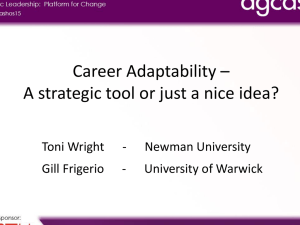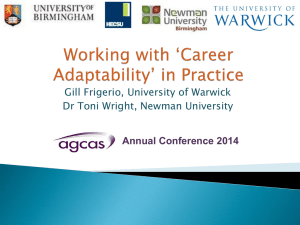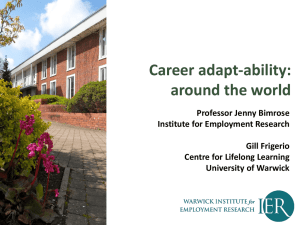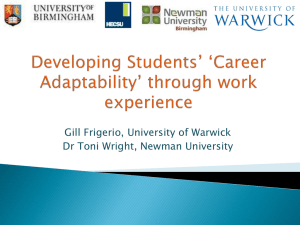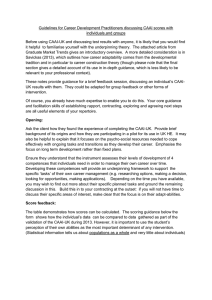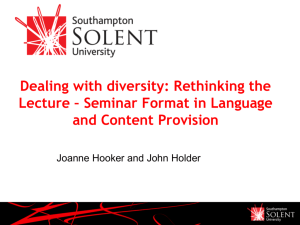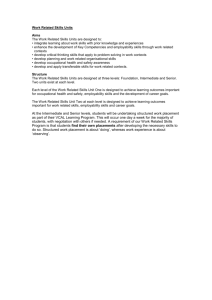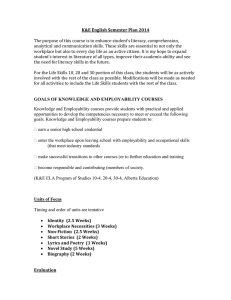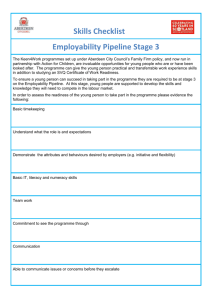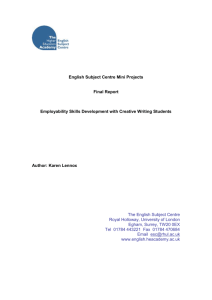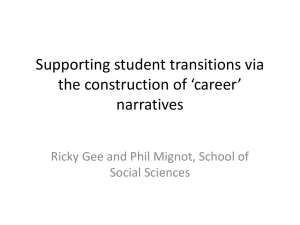Career Adaptability Research to date
advertisement
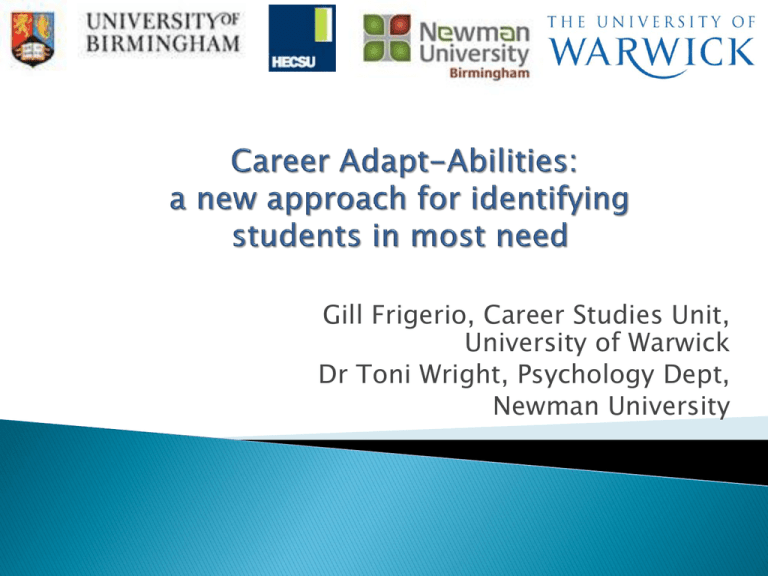
Gill Frigerio, Career Studies Unit, University of Warwick Dr Toni Wright, Psychology Dept, Newman University What is career adaptability? Is it a useful concept for HE Careers & Employability Services? Research to date Our work to develop a UK instrument Applications for HE careers services Has it’s origins in the vocational psychology of Donald Super which developed into Career Construction theory (Savickas, 1997) The focus is on the individual and their psychosocial resources, as opposed to employability – where employers and their needs tend to dominate. The capability of an individual to make a series of successful transitions where the labour market, organisation of work and underlying occupational and organisational knowledge bases may be subject to considerable change’ (Bimrose et al, 2011) Incorporates both individual readiness & resources and the concomitant responses & results Control: exerting a degree of intra-personal influence on their situations Curiosity: broadening horizons by exploring social opportunities & possibilities Commitment: experimenting with new & different activities Confidence: believing in yourself & ability to achieve your goal Concern: developing a positive optimistic attitude to the future Savickas et al. (2009) Career adaptability - a useful theoretical perspective because…? As noted earlier, contrast with employability in its focus on the client: “ ..career belongs to the person, not the organisation” (Duarte, 2004) From adaptability to adapt-abilities (psycho-social competences) which focus on the person and the resources they have available to enable them to manage life and work challenges and transitions Problems with existing psychometric tests – identification of need and targeted interventions is currently problematic Potential for a quantitative measure in line with our purpose and professional values Reported change in employability related values, attitudes & behaviour e.g. reflecting on skills/experiences; applying skills and attributes to specific situations/contexts; Increased ability to articulate skills/attributes Increased confidence leading to higher aspiration However, no change on psychometric tests Rather than increasing student’s cognitive skills, the PSA may be changing their application and the meaning ascribed to their possession (internal change within person rather than simple acquisition of skills) Employability awards may improve an individual’s resources to negotiate the challenges of leaving university and entering the world of work Wright (in prep) International life design group met in 2008 and 2010; 13 countries (not inc. UK) involved in study to develop and validate the Career Adapt-Abilities Scale (CAAS). (Savickas & Porfeli, 2012) In the UK Bimrose and colleagues developed qualitative descriptors. (Bimrose et al, 2011) Evaluation of employability intervention at the University of Birmingham (2010-13) Birmingham, Warwick, Newman and HECSU - UK collaborative project currently ongoing (Glasgow Caledonian also participated in experimental phase of validation) Collaborative project with aim of validating CAAS for use in UK context HEA bid unsuccessful Project scaled down and work continued US version of CAAS adapted to UK context UK version shown to fit four factor model and to correlate with Trait Emotional Intelligence (Cooper & Petrides, 2010) Different people use different strengths to build their careers. No one is good at everything, each of us emphasises some strengths more than others. Please rate how strongly you have developed each of the following abilities using the scale below. Strongest Very strong Strong Somewhat strong Not strong (5) (4) (3) (2) (1) Becoming aware of the education and career choices that I must make Actively engaging with my career Remaining positive Taking responsibility for my actions Acting in line with my values and principles Relying on myself Looking for opportunities to grow as a person Observing different ways of doing things Adapted from Savickas & Porfeli (2012) Birmingham University: 301 students Glasgow Caledonian University : 195 Newman University: 175 Warwick University: 175 Total = 846 After removal of outliers and those with missing values = 753 used in the final model analysis Questions Factor 1-6 Concern 7-12 Control Adapt-ability 13-18 Curiosity 18-24 Confidence Target careers guidance interventions Allocate resources to greatest effect Demonstrating careers guidance impact at individual and institutional level Encouraging students’ reflective career development and effective action planning Any application to your own context? – group discussion To understand career adaptability as a means of developing student centred approaches to employability To consider the value of career adaptability as a way of HE career services targeting their work and resources To contribute to current research in exploring possible applications of the career adaptabilities measure in HE career services To consider the value that the concept, and the questionnaire, could have for your own institutional context Next step: Pilot projects in UK HE institutions Contact Gill Or Toni with any ideas or suggestions for pilot projects in your own institutions Gill: G.Frigerio@warwick.ac.uk Toni: T.Wright@newman.ac.uk We are here this evening so please do chat to us about your ideas if you wish. Bimrose, J., Barnes, S-A., Brown, A. and Hughes, D. (2011) 'The role of career adaptability in skills supply', Wath-upon-Dearne: UK Commission for Employment & Skills Cooper, A. & Petrides, K.V. (2010) A Psychometric Analysis of the Trait Emotional Intelligence Questionnaire-Short Form (TEIQue-SF) Using Item Response Theory, Journal of Personality Assessment, 92, 5, pp.449-457 Duarte, M.E. (2004) The Individual and the Organisation: Perspective in development Psychologica (Extra Serie) 549-557 Savickas, M.L. (1997) Career Adaptability: An Integrative construct for LifeSpan, Life-Space Theory, The Career Development Quarterly, 45, 3, pp.247259 Savickas, M.L., Nota, L., Rossier, J., Dauwalder, J.P., Duarte, M.E., Guichard, J., Soresi, S., Van Esbroeck R. & van Vianen, A.E.M., (2009). Life designing: A paradigm for career construction in the 21st Century. Journal of Vocational Behavior, 75, 3, pp.239-250. Savickas, M.L. & Porfeli, E.J. (2012) Career Adapt-Abilities Scale: Construction, reliability and measurement equivalence across 13 countries, Journal of Vocational Behaviour, 80, pp.661 -673 Wright, T.E. (in prep.) Does it Do What It Says On The Tin? – Evaluation of an established University Employability Enhancement Award in the UK
